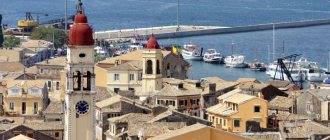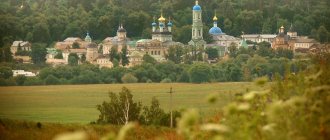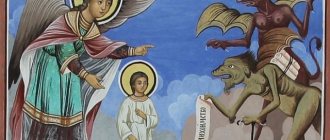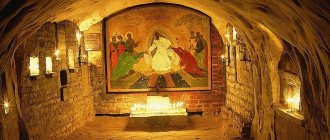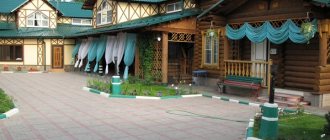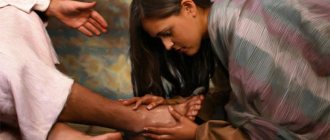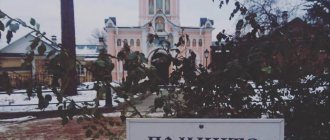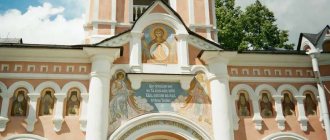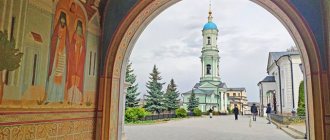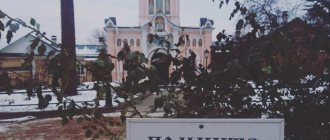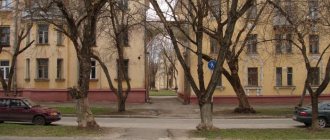Pravoslavie.Ru
A cook, a farmer and a student - about what they look for and find in the famous monastery.
Young people have always been drawn to Optina Pustyn, but recently they can be found here especially often (according to our observations). They travel by bus, train, car. As tourists, pilgrims, workers. They travel in groups, in pairs, or alone. Moreover, they all spend quite a lot of time in the monastery. We decided not to speculate and not look for explanations for this trend in sociology or psychology (or where else are people looking for answers these days?), but asked girls and boys directly: why do they prefer a monastery to fashion exhibitions and TV series?
Alexander. Atheist, probably
Alexander is not a young man, but he was the first person I spoke to that day. He attracted my attention by leaving the Vladimir Church too quickly. I was just standing on the porch and looking in the crowd of pilgrims for someone to pester with questions for the material. In addition, Alexander stood next to me - from here it was convenient for him to film the domes of the Vvedensky Cathedral with his video camera.
“For some reason you came out quickly,” I couldn’t resist.
- Yes, my wife needs this, she believes, she goes to holy places, but I’m more of an atheist, probably.
I liked the word “probably” the most here.
- An atheist, but you still call places holy.
– Well, holy Russian places are history.
It began to rain, it had been coming for a long time.
– In general, we have just started visiting holy places. We’ve already been to Diveevo, now we decided to visit here. We need to go somewhere. I’m not really drawn to going abroad, I need to know my own.
– And nothing ripples in your heart when you walk to holy places?
“No,” Alexander quickly answers, as if he was ready for such a question, “I’m telling you, I’m an atheist, and also a former communist.”
This time I like the word "ex". I want to talk to him about this, but then Alexander nevertheless enters the temple, and my attention turns to the company of young people.
Gold chain. Stories about new miracles of the Optina elders
| Icon of St. prpp. Optina elders. Photo: hram-dimitria.ru |
Before the canonization of the Optina elders, I was given the obedience to collect materials about miracles that happened through their prayers in our days.
“Yes, there are so many of these miracles,” the guide Tatyana immediately told me, “that I never use examples from books, but I only talk about what happened in our group, and at the same time in front of everyone. There was an incident a week ago.
And Tatyana told a story about an old woman, God’s servant Galina. This Galina was once a famous weaver and set records, because since childhood she was fleet-footed and demanded an outlet for the prowess of her soul. And then something happened to the fleet-footed Galina that happens to everyone: youth left - did not say goodbye, old age came - did not say hello. Baba Galya’s legs were now bulging with knots of varicose veins and swelling so much that of all the shoes she could only wear slippers.
Once in a store, a former weaver tried on all the shoes, it seemed, but her feet hurt in any shoes.
“Try to try on these,” the saleswoman offered her Italian boots made of soft leather and with delicate sheep fur inside.
Grandma put on them and couldn’t believe herself: they were soft, comfortable and warm for her feet.
“I’ll take it, wrap it up,” she melted with happiness.
And then she looked at the price tag and realized: these boots were not from her impoverished pensioner life, but from the life of, say, Princess Diana. This is how the temptation began, when the former shock worker of communist labor made an oath to herself - she would break into pieces and buy boots. She now lived from hand to mouth, saving every penny. She also got a job as a concierge in a house for new Russians, where they gave generous tips for services of the kind when you need to drag a drunk high school student to the elevator and clean up her mess. The girl, having sobered up, thrust dollars at the concierge and, swearing, promised that she would break off her grandmother’s horns if she “told” her parents about her adventures.
This lackey's bread was bitter, but we managed to buy boots. It was in these Italian boots that the servant of God Galina came on an excursion to Optina Pustyn and flew here on the wings of happiness. And before leaving the monastery, the boots disappeared. It happened like this. Then the pilgrims spent the night in a room where there were people like in a barrel of herrings: three-story bunks, and in a narrow passage there were a lot of shoes and things. The pilgrims woke up while it was still dark, so that, having hastily visited the temple, they could then move on to other monasteries. The first to wake up that morning was a student from Vologda and, having mixed up her sleepy shoes, put her feet in her grandmother’s boots and ran away in them to the bus or, perhaps, to the temple. In a word, the pensioner got the student’s boots - exactly the same, Italian, but several sizes smaller. How the old woman squeezed her sore legs into them and groaned as she hobbled to the bus, it’s better not to talk about it. But on the bus she burst into tears so bitterly that the guide Tatyana postponed departure for half an hour and told Galina to go to the relics of St. Ambrose of Optina and ask him for help.
“Father Ambrose always helps,” she convinced the sobbing pilgrim. - This is an experience.
- How can I ask for help? – she timidly asked.
- Usually - first repentance, and then petition.
A prayer service was served at that hour at the relics of St. Ambrose of Optina. The old woman fell prostrate before the relics, wanting to repent, and suddenly boiled with anger: it turns out that her boots were stolen, and yet you still repent? Does anyone know at what cost of humiliation she earned her boots? And then she vividly remembered the first time when she helped a high school student in a torn dress get to the elevator, and she was crying so desperately that it was clear: she had been violated. She should feel sorry for this girl or throw herself at the feet of her parents, begging: protect your child! But she only silently condoned the fall when the girl became an alcoholic in front of her eyes.
The old woman was now burning with shame, horrified by the darkness of her mind when boots and damned dollars became more valuable to her than honor and God. She no longer regretted the loss of her boots. But she was so sorry for this stupid schoolgirl that the old woman now prayed for her. Contrite with all her heart, she bowed to the ground in front of the relics and discovered that a student was praying next to her in her boots.
What happened next is already clear. And when pilgrim Galina returned to the bus in her soft, comfortable shoes, everyone was so happy about this quick, immediate help from the wondrous elder Ambrose that they sang together: “Rejoice, Venerable Ambrose, God-wise teacher of faith and piety.”
“Boots are a damn thing,” the shaven-headed brother interrupted the guide’s story. “But a real miracle happened to me.” Listen everyone - I am responsible for the market!
- Don't listen to him. He's a bandit! – said the strict praying mantis, the bandit’s aunt.
“Not a son, but a fiend of hell,” the narrator’s mother supported the aunt.
“Mom, I promised to stop,” the bandit whined.
In general, the story here is like this. Nikolai, that was the name of the “bandit,” grew up in that purely female environment, where his aunts and mother strictly fasted, prayed for a long time and even tried to re-educate their parish priest. As a child, Nikolenka’s aunts called her an angel and often took her to church. And as he grew up, he lost his faith and flatly refused to go to church.
Unfortunately, such stories are not uncommon, and here, for example, is one of them. An old nun raised her orphan nephew. The boy grew up as a meek pilgrim and shunned everything worldly, for his aunt said: “The world lies in evil.” In a word, he was constantly in the temple, but sometimes he asked in surprise:
- Aunt, why is there life and life everywhere, but with us there is only sin and sin?
The boy grew up and drank himself to death, forgetting about God. Something similar probably happened to Nikolai. True, he didn’t drink, but through his friends he got involved in the criminal business and now lived “by the rules.” And all attempts to reason with the apostate gave one result - a scandal.
But there would be no happiness, but misfortune helped. Nikolai, having caught a cold, became deaf and rushed around the room like an animal from unbearable pain in his ears. The aunts declared the disease a punishment for sins, calling for repentance. And the doctor at the clinic ordered me to undergo surgery to remove the accumulated pus from my ears. And then our brave robber became so afraid that he decided to choose the lesser of two evils: it was better to go to the temple to repent than to go under the knife. That’s when the relatives took their “bandit” to holy places in the hope of healing his soul and body. First they visited St. Seraphim of Sarov in Diveevo. Then we visited the Kiev-Pechersk Lavra, and from there we moved to Valaam. When the sick Nikolai was finally taken to Optina Pustyn, he was already so exhausted that he sat indifferently on the steps of the temple and only moaned in pain.
- What's wrong with you? – a hieromonk passing by asked him.
“Father, I’m a fiend from hell, but my ears hurt a lot.”
“God is merciful,” said the hieromonk and led him to the relics of the Venerable Optina Elder Barsanuphius.
The temple was empty, and the hieromonk had disappeared somewhere. And Nicholas stood alone in front of the relics, looking at the fresco depicting the miracle when, through the prayers of the Monk Barsanuphius, a deaf man was healed. He believed that such a miracle happened, because before people loved God, and the Lord helped them. But who needs God, he thought, in the present world, where you have to be tough in order to succeed? From somewhere in his childhood, he suddenly remembered the words of the Gospel about the loneliness of Jesus Christ, when He had nowhere to lay His head. And Nikolai began to cry, repeating to himself: “Lord, there is nowhere for You to bow your head, and there is no place for You now on earth. What kind of life is there if you don't need God? And You, Jesus, for all Your mercies, only they will crucify you again out of anger.” He himself didn’t know why he was crying. But then everything came together at once: unbearable pain in the ears, anguish from a meaningless life and the bitterness of the loss of God.
The tour entered the temple, heading towards the relics. Nikolai hastily brushed away his tears and then discovered that not only his cheeks were wet, but his neck and shoulders. The pus flowed out of the ears, the pain disappeared, and hearing was restored.
“Where sin abounds, grace abounds” (Rom. 5:20). And the healing of the great sinner Nicholas once again testifies to this.
* * *
Still, Nikolai’s story was confusing. Of course, he promised to “kick it off,” but is the price of communication high? However, anything can happen. I remember how ten years ago a racketeer often came to Optina Pustyn in a jeep. In front of the jeep there was a pipe welded with a bracket, which, as it turned out, played the role of a ram. This is exactly how the racketeer rammed and crushed the stalls of those traders who dared to resist the bandits, refusing to pay them tribute. He was a strange pilgrim - he lived for a long time in the monastery and tearfully repented here, and then returned to the world to his robber trade. This story ended with the strange man distributing his property to the poor and leaving forever for a distant northern monastery.
And yet, the fathers of Optina Hermitage tend to have a cautious attitude towards miracles. You used to say in delight:
- Father, Igor changed so much after the miracle that was shown to him.
And the father sighs:
- How long has it changed?
Unfortunately, I myself had to observe how a miracle, seemingly capable of turning a person’s whole life upside down, caused only a temporary spiritual uplift. And then again I was sucked into that routine of life, where the soul had already become close to sin. In a word, what is said in the Gospel is also said about us - somewhere the seed of the Sower falls on a stone, and somewhere on fertile soil, and then the soul accomplishes its feat. That is why I will tell the story of the conversion of Svetlana, who grew up outside the Church and did not even have believing acquaintances who could in any way instruct her.
This is how Svetlana and I met. One day, a very young-looking pilgrim, an officer’s wife, as it turned out, entered the empty temple after a service.
“I am a representative of the regiment,” she said sternly. – Our regiment died in Chechnya. Can you tell me where I can apply for the death?
Hierodeacon Iliodor led the pilgrim to the candle box, and she began to submit not even notes of repose, but lengthy paper sheets with a list of the dead, certified by the seal of the regiment.
– It’s not written according to form. “We need to rewrite it,” the novice who received the notes reprimanded her.
“They have a regiment killed in Chechnya,” the hierodeacon told her quietly and menacingly. – So what, form is more important than soul?
There were so many killed on the battlefield that there were not enough prosphora and Father Iliodor went to the altar to fetch them. Meanwhile, Svetlana was telling me the story of her life, or rather, the story of that great love, where everything was simple and pure. She and Seryozha had been inseparable since childhood. And when Sergei graduated from military school, they got married. Svetlana was already preparing for the birth of her first child and was knitting booties when Sergei and his regiment were sent to Chechnya. A month later, the “black tulip” delivered the first coffins to their unit, and Svetlana was taken by ambulance to the maternity hospital. When other women in labor were screaming in pain, she was screaming in fear for her husband - what if they killed Seryozha and how could she live without him? Thus began her motherhood and path to God. There was not a single church near their military unit. And she and Sergei went to the city to get married, although here they followed, rather, the custom: “that’s how it should be,” it’s so beautiful, and for some reason a civil unmarried marriage did not evoke respect. But they really liked the church, and as a memory of this bright day, Sergei bought a book about the Optina elders from the icon shop. This is all that Svetlana had - one single book about the great saints of God, but she felt with a sensitive heart a breath of holiness unknown to her before. Day and night, while the baby was sleeping, she tirelessly bowed to the ground and prayed to the Optina elders to save, protect and protect the warrior Sergei from death.
According to her, Svetlana did not know how to pray at all. But so great was the love of the young wife that her prayer seemed to go to Heaven. Colleagues later said that Sergei was indeed saved from death by some miracle. The bullets seemed to bend around him, and the shells exploded in the place from which he had just left. The soldiers now huddled closer to their officer, believing that it was safe to be around him. This was such a clear miracle that the regiment’s command decided to send a representative to Optina Pustyn to find out what the conditions of accommodation were and whether the monastery could accept them if their military unit came to pray here. So Svetlana ended up in the monastery and now from the bottom of her heart she thanked the Optina elders for the miraculous salvation of her husband.
She did it in her own way: she would get down on one knee and reverently kiss the icon, just as they kiss the regimental banner at the oath. The novice who was on duty behind the candle box was again worried that everything was “out of shape.” But she did not dare to make a remark, because behind the strange behavior there was the main thing - the experience of living faith.
Svetlana wanted to stay longer in the monastery, but she was breastfeeding her baby and had to leave.
“Oh,” she realized before leaving, “I haven’t venerated the relics of St. Seraphim of Sarov in Optina yet.” And I prayed to him so much about Seryozha.
* * *
Who would dare to assert that only the Optina saints helped the warrior Sergei, and that the Monk Seraphim of Sarov did not help? Or how to isolate purely Optina grace, if the miracles that took place in the Optina Hermitage were preceded by prayers at the shrines of Kyiv, Valaam, Diveevo? These were the questions that ended my obedience.
Once I shared my doubts with Hieromonk Mark from the Pafnutievo-Borovsky Monastery, and instead of answering, he told me the following story.
One married couple did not have children for thirty years, although doctors claimed that they were healthy. All these years they traveled to holy places, begging for a child. Both were already old when they visited the Optina Hermitage and fervently prayed here to the Mother of God and the Optina elders. Leaving Optina, they bathed in the monastery spring of St. Paphnutius of Borovsky. And nine months after this bath, they had a wonderful, healthy son. And the happy spouses believed - a son was given to them through the prayers of the Monk Paphnutius of Borovsky. So they came to the Pafnutyevo-Borovsky Monastery with a request to baptize their child here.
“They didn’t baptize in our monastery then,” said Hieromonk Mark. “But I gladly baptized this baby.” This is truly a child of prayer, whom his parents have been begging for for thirty years.
In happiness, past sorrows are forgotten. And the happy parents no longer remembered how they had prayed and grieved over their infertility for thirty years. Now the baby smiled at them like the clear sun and they remembered only the bright waters of the spring with the icon of St. Paphnutius of Borovsk on the wall.
Actually, the same thing happened at my obedience: people remembered only the “result” - the wonderful help through the prayers of the Optina elders. And the most important thing was forgotten: how, for the sake of healing the soul, the Lord tested them with sorrows and the miracle was preceded by a long path of repentance and pilgrimage to holy places.
In general, I filled up several notebooks at that obedience, and in the end I discovered: a purely Optina “small miracle” was only the story with the boots. In other cases, the Optina elders helped people together with other saints, and this spiritual connection was inextricable. Such stories were not quite suitable for canonization, and I hid my notes away, forgetting about them for a long time. And recently I read the following from St. Simeon the New Theologian:
“...The saints who come from generation to generation through doing the commandments of God are combined with the saints who preceded them in time, are illuminated like those, receiving the grace of God through communion, and become like a kind of golden chain, in which each of them is a separate link, connecting with the previous one through faith, works and love, so that in the one God they form a single chain that cannot be easily broken.”
This is truly an unbreakable golden chain. Therefore, I will tell you a few stories from those forgotten notebooks where the connection of the Optina saints with the Monk Seraphim of Sarov or the Monk Paphnutius of Borovsk was clearly revealed.
One local resident asked to record such an incident. Her younger sister’s newborn baby was dying of pneumonia in the hospital. The doctor was good and tried to help, but the baby was fading away before our eyes. One day, a young mother heard a doctor say to a nurse:
“It’s a pity for the baby, he’ll die in an hour or two.” The agony has already begun.
Then the mother grabbed the child in her arms and, escaping from the hospital, rushed by taxi to Optina, to the monastery spring of St. Paphnutius Borovsky. It was thirty-degree frosts at Epiphany. But she remembered her grandmother’s stories about healings at this source and, with a prayerful cry for help, she dipped the baby three times into this icy font. Then she wrapped the child in her fur coat and took him home. Let, she thought, at least die among his family. And the baby slept for almost a day and woke up healthy.
And one of my village acquaintances, the already deceased grandmother Ustinya, saw with her own eyes the Monk Paphnutius of Borovsky. Once, when she was still a girl, she was too lazy to go to the river to rinse her clothes and decided to rinse them in the spring of St. Paphnutius of Borovsky. By that time the monastery was already ruined and closed, the chapel over the spring of St. Paphnutius of Borovsky was also destroyed. And the pioneer leader explained to them at school that the holy springs are a blatant lie of the priests, because the water in them is just water. But when Ustinya dipped soapy laundry into the spring, the Monk Paphnutius of Borovsky began to rise from the water - she immediately recognized him from the icons. And the monk looked at her so sternly, threatening with his finger, that the girl ran away from the source in fear, throwing the basket of laundry to the ground.
A similar case happened with a friend of mine. After baptism, he lived the whole summer in the Optina Hermitage and every day went to the spring of St. Paphnutius of Borovsky. One day after bathing, he discovered that clods of mud were stuck to his shoes, and he washed his shoes in the spring. The water in the font turned dark with dirt, and my friend’s eyes darkened. He was horrified to discover that he was going blind and could barely distinguish objects. Somehow he got to my house and said from the threshold:
“I am going blind because I desecrated the holy spring.” I already realized what a sin this is.
The doctor then told him something incomprehensible about dark water in his eyes. And it took two surgeries before my vision began to recover.
* * *
Naive stories about how some pilgrims like Svetlana are looking for the relics of St. Seraphim of Sarov in the Optina Hermitage, considering him the Elder of Optina, are also far from naive. And here is one of such stories.
One day a young woman came to Optina Pustyn and asked to be baptized here.
– Why do you want to be baptized in Optina? - Hegumen Sergius (Rybko), now the rector of the Moscow church, and at that time the Optina hieromonk, asked her.
“And one old man comes to me and keeps trying to persuade me to be baptized. So I came to be baptized by him.
The visitor described the appearance of her “elder” in such detail that Father Sergius suspected: what if one of the Optina elders really came to her? He began to show her photographs and icons of the Optina elders, but the woman confidently answered: “Not him.” And suddenly she beamed with happiness when she saw the icon of St. Seraphim of Sarov:
- Yes, here is my old man, here he is, my joyful one! He even says, you know, like this: “My joy, please be baptized.”
Great saints of God sometimes see saints. But for St. Seraphim to come to an unbaptized person in our days is, you see, worthy of surprise. Father Sergius began to question the woman, asking what was special about her. But there seemed to be nothing special in her life - she lives in a one-room apartment with her husband, son and paralyzed mother-in-law, and works as a saleswoman. The salary was more than modest, but the woman did not even think that she could shortchange or underweight someone. And she also couldn’t imagine how she could quarrel with her husband without ever quarreling with him. In addition to her son, she would like to have more children, but the Lord does not give children yet. And the young woman not only did not feel burdened by caring for her paralyzed mother-in-law, but literally doted on her mother-in-law.
“My husband and son and I hardly go anywhere, so as not to leave our grandmother alone,” she said. “But the three of us sit in the evenings, talking about something, but for some reason there is such joy in my soul that I don’t know how to tell it.
Roman, cook
A girl and two guys - without umbrellas, without raincoats, just as there is no rain - slowly walk around the shrines of the monastery, the graves of the elders, the Worship Cross... But what catches your eye is not that they do not notice the rain and do not fuss, but their appearance, more reminiscent of the view hippie. One guy in particular stands out - long blond hair, jeans, checkered shirt. I come over and let’s get acquainted. Roman is from Kaluga, but has been living in Kazan for 6 years: he found his wife there (the smiling, modest girl moved away a little from us so as not to interfere with the conversation), and got a job. “I’m a cook, I’ve been baking pizza for the last year, but I quit before coming here,” says Roman.
– Why did you come to Optina at all?
- Well, how?! – Roman is surprised by the question. “I want salvation...” and, after a little hesitation, he adds: “salvation for everyone.” We came for spiritual guidance and personally to Father Nikon to talk and seek advice. To visit holy places, too. We’ve been to Klykovo, now we’ll go to Shamordino.
Behind the routine pilgrim explanation, in fact, there was hidden a story atypical for young people. After a little more time, Roman said:
– I personally came to God at a mature age, well, relatively mature, at 19 years old. Before this, I was generally far from faith, I was not raised in it, my mother still has a sharply negative attitude towards it. But it’s okay, my wife looks differently!
I have a friend, he came to faith a little earlier than me, but he never convinced me, we just talked about God. And then... I remember this day very well... I sat and read the news about what was happening in the world, and there were some explosions, wars, floods, children were killed somewhere, something else somewhere, and I ran to the temple. I saw the priest in the church and said: I don’t believe it, well, I don’t have faith, but I really want it to be. What should I do, where should I start? He told me: “You pray that they give you faith.” That's all. Then off we went. He became a church member.
This is our fourth time coming to Optina. People are drawn here, and besides, there is such a history here, even atheists come.
When Roman said the words “history” and “atheists,” I probably even turned pale.
– Do you think that only history attracts them?
- The spark of God is drawing. They come as tourists and leave as pilgrims. Well, that is, they themselves do not realize, perhaps, what places they came to, without any Christian motives, and then, maybe, it works! The story of Red Easter attracts many; this is when the murder of three monks occurred here in 1993.
– Today, it is this story that most, so to speak, “catches” young people?
- More than me, yes. But the elders too. When you read the sayings, you come across interesting things: “every man is a lie—and so am I.” They're so short and pretty. In general, it seems to me that any Orthodox person is drawn here. And that's okay.
Roman, his friend and his wife go towards the chapel at the burial site of the monks killed in 1993. The rain is still pouring down in buckets. But still no one notices him. Everything around is as usual: crowds of pilgrims, surrounding graves, temples, one of the brethren...
Only perhaps the famous monastery crows have calmed down.
Andrey, future official
I saw Andrey on a bench near the southern monastery wall. He looked tired, but peaceful. Worker, I guessed.
And indeed, Andrei comes to Optina for the third time as a laborer, each time for two weeks, now his obedience takes place in the monastery garden. “We picked 15 bags of apples yesterday, I also picked sea buckthorn, and I pricked all my fingers,” Andrei is not complaining, I asked him to paint the life of a modern worker, “but mostly we work on farmsteads, cowsheds, horses, you name it.”
– Are there many young workers among the workers?
– I would like more, but there is. Probably not all young people are ready to get up at five in the morning! – Andrey laughs.
It’s easy for Andrey himself to get up early. Student habit. He studies at the prestigious RANEPA, in public administration. That is, he is a future official. “Although I’m not really drawn to this, I’d rather work somewhere with people, and not in the State Duma.”
– What draws you to Optina?
– I practiced sambo for 10 years, then an injury occurred, a vessel in my head burst, and after that my health deteriorated. And there is a fear of dying without repentance, I guess you can say that. So I travel to monasteries. Since childhood, my father led me to faith.
And I also escape from the hustle and bustle. There is very heavy traffic in Moscow, a lot of extraneous things to do, running around, the Internet, messengers... When you come here, you think, what’s the point of all this, it’s still pointless. But then you still have to come back - school, parents who need attention...
...We are sitting opposite the graves of the brethren of the monastery; wooden and black iron crosses are crowned with mounds strewn with flowers. My interlocutor looks at all this not through the eyes of a pilgrim, but as if through crosses, through flowers - they look so that my next question is: would you like to stay in Optina forever? - disappears by itself.
“We have to somehow hold on to faith in the world and not forget God.” Of course, this is very difficult. Because passions constantly overcome,” Andrey does not hide.
– There are so many attacks on the Church now. Does this reduce the chances of finding understanding among peers? Do you have arguments with them about religion?
– The devil actually very cunningly deceived our young generation, everything negative is on the Internet, and all life is now there. People don’t even understand that there is another world, that there is Optina, that there is another country and another life. It is becoming increasingly difficult to explain to the unchurched some of the essence of Orthodoxy, to talk about priests. Nobody even knows that there are clergymen who fought, who do a lot of good... Usually, young people have a stereotypical, internet-based idea of them. But we must defend our priests, we must always do this. I usually simply explain: look, you go to the store to buy bread, but in order for this bread to appear on the counter, intermediaries are needed, someone prepares it, someone brings it. Without “someone” this bread would not exist. Priests are also intermediaries; without them it is impossible to perform church sacraments. The priest, as a conductor, connects God and man.
And I don’t know what attacks on the Church there could be—the Lord cannot be mocked.
The ringing of the bell calls everyone to the service. Andrey apologizes and leaves. Along the way, he bows to those graves that he looked at so soulfully throughout the conversation.
Secrets and wonders of Optina Pustyn
The Monk Ambrose of Optina is a recently lived saint, the founder of the Shamordino hermitage and the Optina elder, teacher and healer. He had a very great influence not only on the peasants who loved and revered him, but also on the educated society of the 19th century.
The future reverend was born into the family of a rural priest, but even during the seminary days he was a notorious... dandy. Only a serious illness forced him to completely reconsider his views, making a vow to God to enter a monastery.
October 8, 1839 He arrived in Optina, where he was joyfully accepted as a novice by the Reverend Elder of Optina Leo (Nagolkin). Father Lev immediately made the young and educated novice his cell attendant, that is, his secretary and assistant. In addition, as a novice, the future saint performed a number of difficult obediences in the refectory: he cooked yeast and was a baker. A short time later, in 1841, Alexander took monastic vows and was named Ambrose, in honor of St. Ambrose of Milan, a preacher and educator.
In 1842, he was tonsured into the mantle, that is, the “small angelic image,” the small schema. He took vows of obedience to the abbot of the monastery, renunciation of the world and non-acquisitiveness - that is, the absence of his property, everything from now on belonged to the monastery and the monastery itself took upon itself the responsibility of ensuring the life of the saint. This tonsure of monks has been going on since ancient times and continues to the present day.
A year later, Saint Ambrose was ordained a hierodeacon, that is, he was made a monastic clergyman who does not perform the Liturgy, but participates in divine services and helps the priest. That same year, the Lord sent him a new test, a new serious illness: having caught a cold in the winter, he fell ill. The brethren thought that Ambrose would die and, according to tradition, on December 9, 1845, he was ordained a hieromonk, as if giving consolation to his soul. The saint could hardly move and was between life and death for two years, but he survived. However, until his death, which followed in 1891, he could not perform divine services and was almost unable to even move, being lying down most of the time. The cell attendant looked after him.
The holiness of St. Ambrose illuminated everyone who came to him. This physically weak man was spiritually great. He endured his serious illness with patience, consoling many thousands of people who came to him. At first he became an elder only of the Optical Monastery, and then many ordinary people began to come to him, who had fallen in love with the monks about the elder’s foresight. The Lord gave him knowledge of human thoughts, insight into the present and the gift of predicting the future - that is, advice regarding the future. After all, the priests of the Orthodox Church differ from psychics and fortune-tellers in that, seeing the future by the Spirit of God, they do not simply say what will happen, but give advice on how best to act in obedience to the will of God.
The elder never showed people the severity of his entire condition, but told how glad he was to serve and help people. Without getting out of bed, he gave his blessing to transfer material assistance to those in need. Seminary students, residents of orphanages and almshouses, and widows lived under his care. He remembered everyone, learned about everyone’s life.
A circle of admirers of the holy elder was formed, who also wanted to devote their lives to God and people, and the Monk Ambrose blessed the creation of the Shamordino Monastery, known today throughout Russia - the Kazan Ambrosian Hermitage. Here they took care of children and the elderly, cultivated the land, and helped sick residents of the surrounding area in the hospital (it must be said that in those days the very creation of the hospital was a good deed: rural medicine was not developed, and when transported on horses, patients often died).
All the elder’s time was occupied either with prayer, or answering letters, or communicating with visitors: peasants, nobles, and dignitaries came to him, and to requests for a blessing for feeding turkeys, and to questions about the state structure, he answered with the same attention and love. Knowing the mood of the intelligentsia, their thoughts - after all, before taking monastic vows, he managed to spend time in secular society, studying at the seminary - he exhorted these people not to indulge in empty philosophy, speculative tangles of thought, but to firmly profess Orthodoxy, which means to live the church life, to work on ourselves according to the covenants of the Fathers of the Church.
The elder died in the Shamordino monastery, but according to the will of the monk, his body was buried in the saint’s native Optina Hermitage.
On his tombstone were carved the words of the Apostle Paul, if translated into Russian: “He was for the sick as one who was weak, so that he might win the sick also for the Church of God. He was everything to everyone in order to save at least someone.” This refers to the saint’s self-denial, his love for all people and understanding. His grave was located near the burial of St. Macarius, the spiritual mentor of the monk, who was the confessor of the monastery before him; now there is a chapel above the place of his burial, and the relics are in the Vvedensky Cathedral of the monastery.
